|
|
|
Sort Order |
|
|
|
Items / Page
|
|
|
|
|
|
|
| Srl | Item |
| 1 |
ID:
179531
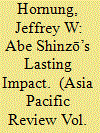

|
|
|
|
|
| Summary/Abstract |
Abe Shinzō’s long duration in office brought to Japan strategic vision, international respect, and a forward-leaning commitment to strengthen Japan’s defenses and uphold the major tenants of the international order. This article examines Abe’s achievements in the security and foreign policy domains. Specifically, it examines his domestic achievements in establishing the National Security Strategy and National Security Council, reinterpreting Japan’s ability to exercise its right to collective self-defense, passing a suite of security legislation, and strengthening of Japan’s Self-Defense Forces. It also examines Abe’s foreign policy achievements of increasing Japan’s international presence and global role, expanding Japans’ strategic ties, creating and exporting a strategic framing vision called the Free and Open Indo-Pacific, and helping to establish the grouping of four maritime democracies called the Quad. The article argues that Abe’s desire for Japan to play a larger, more proactive role helped leave Japan—and the region—in a stronger place.
|
|
|
|
|
|
|
|
|
|
|
|
|
|
|
|
| 2 |
ID:
108107
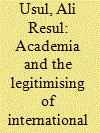

|
|
|
|
|
| Publication |
2011.
|
| Summary/Abstract |
This article aims to highlight the connection between academic studies and international politics and to provide an academic justification of foreign policies with particular reference to the case of democratisation studies. It embodies a two-way relationship. On the one hand, the conjunctures of international politics influence the nature of academic studies in the discipline of Political Science; on the other hand, academic studies may sometimes be employed as sources of legitimisation of the foreign policies of states. The article discusses these connections, providing particular examples of academic studies of the democratisation process during the Cold War and the post-cold war era.
|
|
|
|
|
|
|
|
|
|
|
|
|
|
|
|
| 3 |
ID:
092087
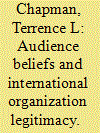

|
|
|
|
|
| Publication |
2009.
|
| Summary/Abstract |
Recent work suggests that multilateral security institutions, such as the UN Security Council, can influence foreign policy through public opinion. According to this view, authorization can increase public support for foreign policy, freeing domestic constraints. Governments that feel constrained by public opinion may thus alter their foreign policies to garner external authorization. These claims challenge traditional realist views about the role of international organizations in security affairs, which tend to focus on direct enforcement mechanisms and neglect indirect channels of influence. To examine these claims, this article investigates the first link in this causal chain-the effect of institutional statements on public opinion. Strategic information arguments, as opposed to arguments about the symbolic legitimacy of specific organizations or the procedural importance of consultation, posit that the effect of institutional statements on public opinion is conditional on public perceptions of member states' interests. This article tests this conditional relationship in the context of changes in presidential approval surrounding military disputes, using a measure of preference distance between the United States and veto-wielding members of the UN Security Council. Findings indicate that short-term changes in presidential approval surrounding the onset of military disputes in the United States between 1946 and 2001 have been significantly larger when accompanied by a positive resolution for a Security Council that is more distant in terms of foreign policy preferences. The article also discusses polling data during the 1990s and 2000s that support the strategic information perspective.
|
|
|
|
|
|
|
|
|
|
|
|
|
|
|
|
| 4 |
ID:
119625


|
|
|
| 5 |
ID:
160957
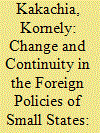

|
|
|
|
|
| Summary/Abstract |
The 2012 parliamentary elections witnessed Georgia’s first peaceful post-independence transfer of power. Under Bidzina Ivanishvili, the government formed by the Georgian Dream Coalition significantly softened the harsh anti-Russia rhetoric of Saakashvili’s ‘National Movement’, launching a policy aimed at normalising relations with Russia. Such a shift of a steady, almost decade-long counter-Russian foreign policy resists explanation by structural theories on small states located in relatively stable external environments. Mapping discursive changes and employing a constructivist framework, we argue that distinct foreign policy visions are reflections of the differences between the identities of the two leadership camps.
|
|
|
|
|
|
|
|
|
|
|
|
|
|
|
|
| 6 |
ID:
129598
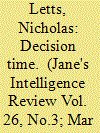

|
|
|
| 7 |
ID:
130967
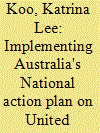

|
|
|
|
|
| Publication |
2014.
|
| Summary/Abstract |
Australia's victory in securing temporary seats on the United Nations Security Council and the United Nations Executive Board has been much celebrated. This provides an important platform for Australia to further the agenda of women's rights worldwide. As part of this agenda, Australia has provided a commitment to implement United Nations Security Council Resolution 1325 on Women, Peace and Security through the development of the National Action Plan on Women, Peace and Security 2012-2018, released in 2012. This article examines the early thoughts and efforts towards the implementation of this plan. It demonstrates that while there is a broad rhetorical commitment to implementation by Australian actors, there are nonetheless challenges that may threaten its success. Based in part upon interviews with Australian government representatives and policy makers, and activists and advocates of the Women, Peace and Security agenda, this article highlights the success, challenges and opportunities that have so far been associated with implementing this important Resolution.
|
|
|
|
|
|
|
|
|
|
|
|
|
|
|
|
| 8 |
ID:
129208
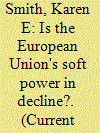

|
|
|
|
|
| Publication |
2014.
|
| Summary/Abstract |
Almost twenty-five years ago, the political scientist Joseph S. Nye Jr. coined the term "soft power" to capture the influence that the United States exercises not through coercion or inducement but through attraction. Coercion and inducement-the stick and the carrot-are forms of command power (or what Nye calls "hard power"), delivered via economic, diplomatic, or military instruments. Command power is used to compel or bribe others to do what you want them to do. Soft power, in contrast, is less a policy instrument to be wielded than an indirect force; it emanates from the attractiveness of a state's culture, political values, and foreign policies. Soft power encourages other international actors to cooperate with a state (or a multistate organization like the European Union) to pursue what they perceive as shared goals and values. It is therefore a less costly means of attaining desired outcomes than the use of command power.
|
|
|
|
|
|
|
|
|
|
|
|
|
|
|
|
| 9 |
ID:
116604


|
|
|
|
|
| Publication |
2012.
|
| Summary/Abstract |
Despite all the optimism accompanying the uprisings of 2011, the Arab Middle East remains a stagnant region in deep socio-political crisis with little chance for positive change anytime soon. The current regimes may stay in power or get replaced by new dictatorships, moderate or radical. Either way, in the near future, weak states will continue to grapple with domestic problems and the direction of their foreign policies. For good reason, this situation has Israeli leaders worried about the implications for their country's national security. The changing regional balance of power favors Turkey and Iran, both of whom encourage radical elements in the region, not Israel, while the seeming decline in U.S. clout has negatively affected both the Arab-Israeli peace process and Israel's deterrent power.
|
|
|
|
|
|
|
|
|
|
|
|
|
|
|
|
| 10 |
ID:
130966
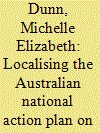

|
|
|
|
|
| Publication |
2014.
|
| Summary/Abstract |
In the bid for a non-permanent seat on the United Nations (UN) Security Council, the Australian government emphasised international peace and security and Indigenous peoples as two of the eight key elements supporting its nomination. Australia's positive track record in support of the UN Women, Peace and Security (WPS) agenda, including the delivery of an Australian National Action Plan (NAP) along with recognition of historical injustices to Indigenous Australians, was highlighted as a valid and important argument in favour of its nomination. The Australian NAP, however, has all but ignored the local context in its development and application, focusing instead on its commitments abroad. This framing of the Australian NAP is informed, firstly, by the WPS agenda policy framework applying to conflict and post-conflict situations, and, secondly, by its location within the UN mandate, requiring those situations to be internationally recognised. This article applies Nancy Fraser's tripartite justice framework to reveal that the Australian NAP gives rise to the political injustice of 'misrepresentation' in relation to intra-state (violent), domestically situated Indigenous-settler relations, which are denied the status of ongoing internationally recognised conflict. The author suggests that the remedy to this injustice is to reframe and recognise the conflict status of Indigenous-settler relations in the localisation of the Australian NAP. This localisation creates openings for Indigenous Australian women to engage with the WPS agenda in meaningful ways.
|
|
|
|
|
|
|
|
|
|
|
|
|
|
|
|
| 11 |
ID:
187093
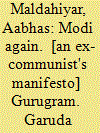

|
|
|
|
|
| Publication |
Gurugram, Garuda Prakashan Pvt Ltd, 2019.
|
| Description |
vi, 189p.pbk
|
| Standard Number |
9781942426127
|
|
|
|
|
|
|
|
|
|
|
|
Copies: C:1/I:0,R:0,Q:0
Circulation
| Accession# | Call# | Current Location | Status | Policy | Location |
| 060229 | 320.54/MAL 060229 | Main | On Shelf | General | |
|
|
|
|
| 12 |
ID:
092337


|
|
|
|
|
| Publication |
2009.
|
| Summary/Abstract |
Consideration of the effects of domestic politics on international conflict behavior often consists simply of contrasting democracies with non-democracies. One notable exception is work that links economic performance and the use of force. This link has often been addressed through use of a diversionary perspective. In this paper, we argue that more important than the alleged incentive to pursue a rallying effect when times are bad are domestic political and economic factors affecting leaders' constraints, representing some of the costs to pursuing adventurous foreign policies. We examine three sources of constraints on democratic leaders: the willingness of the constituency to support the use of force internationally; the macroeconomic preferences of the party's constituency; and an interaction of those preferences with the state of the economy. We find that in developed democracies, the political orientation of the government is a significant factor affecting the likelihood of international conflict initiation. Specifically, right governments are more likely to initiate interstate disputes; economic conditions have a significant but lesser impact.
|
|
|
|
|
|
|
|
|
|
|
|
|
|
|
|
| 13 |
ID:
130968
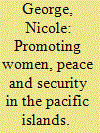

|
|
|
|
|
| Publication |
2014.
|
| Summary/Abstract |
How has the Women, Peace and Security agenda been advanced in the Pacific Islands? While some observers argue that this region suffers from a contagion of unrest, violence and state weakness, these estimates commonly ignore the vital work women have performed in the region as promoters of peace and security. Even when such activity places them in direct personal danger, women across the region have spearheaded efforts to bridge communal boundaries and challenge the increasing normalisation of violence, gendered and otherwise, that accompanies threatened or actual incidents of conflict. As this article demonstrates, these efforts have had profound impacts on the ground in conflict-affected Pacific Island countries. They have also received increased recognition at the level of institutional politics, with member states of the Pacific Islands Forum recently accepting a Regional Action Plan on Women, Peace and Security. This has been hailed as a significant achievement for the region's women peacebuilders. But much of this plan is focused on women's contributions to peacebuilding at the pointy end of a crisis. This overlooks the extent to which the 'slow violence' of environmental degradation, masculinised politics and militarism also compound gendered insecurity in the region. Attention to these issues offers a contradictory picture of the gains made in promoting the Women, Peace and Security agenda in the Pacific Islands. While this advocacy framework has provided important opportunities for the region's women peacebuilders, it may also have discouraged broader reflection on the prevailing structural conditions at work across the region which function in an attenuated fashion to undermine women's security and the achievement of a gendered regional peace.
|
|
|
|
|
|
|
|
|
|
|
|
|
|
|
|
| 14 |
ID:
102992
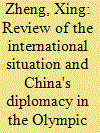

|
|
|
| 15 |
ID:
097917
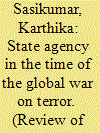

|
|
|
|
|
| Publication |
2010.
|
| Summary/Abstract |
The evolving international counter-terrorism regime obliges and permits countries to make changes in their domestic and foreign policies. At the same time, policy-makers in national capitals respond creatively to the global regime. By examining India's response to the evolving international regime on terrorism, I will demonstrate the mechanism through which the regime is influencing Indian policy: by setting up an identity that the country can aspire to. Further, by highlighting the leveraging of regime norms by the Indian state to further its own projects, I will show that states are not restricted to either passively receiving and complying with international norms on the one hand, or rejecting them on the other.
|
|
|
|
|
|
|
|
|
|
|
|
|
|
|
|
| 16 |
ID:
130970


|
|
|
|
|
| Publication |
2014.
|
| Summary/Abstract |
Many conflicts in the Asia-Pacific region have included sexual violence crimes targeted primarily against women. However, in comparison to other regions, Asia-Pacific states have been reluctant to embrace international law innovations to end impunity for such crimes into the future, as evidenced by their unwillingness to become signatories to the Rome Statute of the International Criminal Court. Of the 39 countries constituting the Asia-Pacific region, only 17-less than half-have joined the Rome Statute. This article initially surveys some of the reasons for non-ratification of the Statute. It further examines the role of civil society and the potential normative impact of the Statute to enhance national sexual violence legislation and prosecutions. Finally, it identifies some practical steps that the Australian government could take to encourage regional states to ratify, implement and enforce the Rome Statute in order to further protect all victims of international crimes and bolster the broader Women, Peace and Security framework.
|
|
|
|
|
|
|
|
|
|
|
|
|
|
|
|
| 17 |
ID:
140281
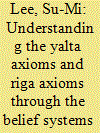

|
|
|
|
|
| Summary/Abstract |
This research employs stakeholder analysis based on the Advocacy Coalition Framework (ACF) to examine two coalitions of US foreign policy during the postwar and early Cold War periods. It defines the proponents of the Yalta axioms and the proponents of the Riga axioms as two purposive groups based on ideological positions. By identifying the stakeholders, their strategic bases, their belief systems (with respect to the Soviet Union), and their policies and resources, this research demonstrates how each coalition formed and competed with the other. More importantly, it offers a way to understand the seemingly inconsistent policy positions of Kennan and Bohlen that supported the Riga axioms at one time and opposed them at another time. By so doing, this research demonstrates the utility of the ACF in examining foreign policies.
|
|
|
|
|
|
|
|
|
|
|
|
|
|
|
|
| 18 |
ID:
086150


|
|
|
|
|
| Publication |
2008.
|
| Summary/Abstract |
Why do democratic states try to deceive their own citizens as to the foreign policies they practice, their motives, and their consequences? This question presupposes not only that states craft 'stories' to disguise activities abroad, but that they do so because they are constrained by an audience of non-elite actors. Theories derived from realpolitik, at best, make little allowance for such domestic 'interference'. Yet there is evidence that in democracies the role of mass publics in driving, curbing, or modifying the conduct of foreign policy is a force, and explanatory factor, to reckon with.
|
|
|
|
|
|
|
|
|
|
|
|
|
|
|
|
| 19 |
ID:
130965
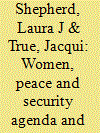

|
|
|
|
|
| Publication |
2014.
|
| Summary/Abstract |
What is the 'Women, Peace and Security agenda' and why is it relevant now for Australia? During 2013-14, Australia is a non-permanent member of the United Nations Security Council and, with a growing foreign military, peacebuilding and aid presence around the world, the country must play a role in preventing conflict, in protecting women and girls from violence before, during and after conflict, and in encouraging the participation of women in these peace and security decisions in order to create the structural, gender-equal conditions for lasting peace. This article highlights the promises made by Australia during the campaign for the Security Council seat. It evaluates the credibility of the campaign commitments by assessing Australia's foreign policies and overseas aid spending on women and peacebuilding in Asia and the Pacific; exploring the avenues for government-funded research on women, peace and security issues to influence government policies and programs; and taking stock of the government's record of engaging with civil society in developing and carrying out its National Action Plan on Women, Peace and Security. The article suggests concrete actions that would allow Australia to fulfil its promises and progress its international leadership on the major pillars of the Women, Peace and Security agenda.
|
|
|
|
|
|
|
|
|
|
|
|
|
|
|
|
| 20 |
ID:
130969
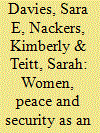

|
|
|
|
|
| Publication |
2014.
|
| Summary/Abstract |
The Association of Southeast Asian Nations (ASEAN) Secretariat and its member states have repeatedly professed their commitment to the protection and advancement of women's economic and human rights. Such commitments have included the Declaration of the Advancement of Women in the ASEAN Region in 1988, the Declaration on the Elimination of Violence against Women in the ASEAN Region in 2004, and the ASEAN Human Rights Declaration in 2012, as well as the establishment of the ASEAN Committee on Women in 2002 and the ASEAN Commission on the Promotion and Protection of Women and Children in 2009. However, none of these regional commitments or institutions expressly take up the core concern of the Women, Peace and Security agenda set out in United Nations Security Council Resolution 1325 in 2000. ASEAN has no 1325 regional action plan and, amongst the ASEAN membership, the Philippines is the only state that has adopted a 1325 National Action Plan. The authors explore the possible reasons for the lack of ASEAN institutional engagement with 1325, outline the case for regional engagement, and suggest specific roles for the ASEAN Secretariat, donor governments and individual member states to commit to United Nations Security Council Resolution 1325 as a regional priority.
|
|
|
|
|
|
|
|
|
|
|
|
|
|
|
|
|
|
|
|
|